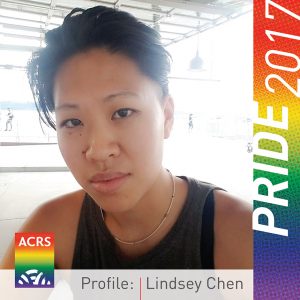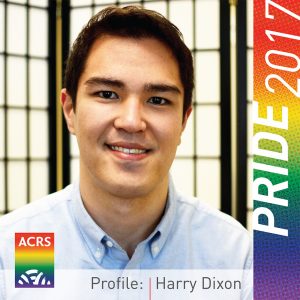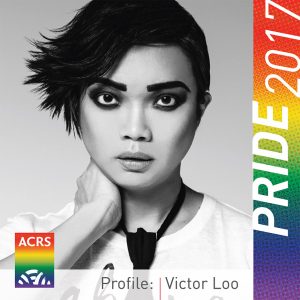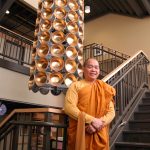Celebrating All Colors of the Rainbow
By Andria Keirn, Americorps Employment and Self Sufficiency Aide
Throughout the month of June, hundreds of thousands of people pack the streets of major cities across the country (and the world) to take part in Lesbian Gay Bisexual Trans Queer (LGBTQ+) Pride month. For those who are unfamiliar, the “+” symbol is used to acknowledge other identities, including Intersex, Asexual, Agender and others.
Pride month is an opportunity to increase the visibility of the LGBTQ+ community, promote dignity, advocate for equality of rights and celebrate diversity. It’s also a time to acknowledge the hard-fought strides forward in securing civil rights that make our country a more inclusive place for everyone.
In the summer of 1969, the Stonewall riots ignited the flames that helped the gay rights movement spread like wildfire across our nation. An article covering the riots by Jerry Lisker appeared in the New York Daily News on July 6, 1969 with the headline, “Homo Nest Raided, Queen Bees are Stinging Mad.” The rest of the article was a colorful, if not belittling account of the systematic targeting and harassment of New York City’s LGBTQ+ community at the hands of local police. It also reflects the general public’s sentiment of LGBTQ+ people at the time it was written. To say that it was intolerant would be an understatement.
Among those who took part in these demonstrations were two trans women of color, Marsha P. Johnson and Sylvia Rivera, who continued to lead public acts of resistance and rallied a community that survived in the shadows. They and many others put us on the road to ending legal discrimination, imprisonment and harassment of the LGBTQ+ community in the United States.
Today, nearly half a century later, we can see how far the movement for equality has come. Hate crimes against LGBTQ+ persons were criminalized at the federal level in 2009 with the signing of the Matthew Shepard Act. In 2015, the Supreme Court advanced marriage equality for all Americans by ruling that same-sex marriage is a legal right in Obergefell v. Hodges. The White House showed its support with presidential proclamations acknowledging June as Pride month, and by tweeting an image of the presidential residence awash in rainbow lighting.
Even as we celebrate the advances in civil rights for all Americans, it’s important to recognize that our work is not yet done, and that we must continue advocating for social justice and equal rights for everyone who lives in the U.S. In contrast to previous years, we’ve seen a shift away from events that are purely celebratory in nature to make room for displays of resistance against threats to the progress we’ve made. From Los Angeles to Washington, DC, Pride festivities morphed into protests against a political agenda that endanger the safety and rights of LGBTQ+ persons, immigrants, refugees and other marginalized communities.
This Pride month, the White House stood devoid of rainbow lights. President Trump broke from tradition and failed to acknowledge June as Pride month. Instead, he kicked off the month by serving as a key speaker for an anti-LGBTQ+ group, the Faith and Freedom Coalition (FFC). During FFC’s Capitol Hill conference, the president praised the group that vocally opposes same-sex marriage, believes being gay is preventable and promotes conversion therapy by calling it a “beautiful movement.” Vice President Pence has voted against laws that protect LGBTQ+ people from discrimination, opposed the repeal of “don’t ask don’t tell,” rejected the Obama administration’s directive on transgender restrooms, and has also made it clear that he does not support same-sex marriage. The current administration is enforcing harsh immigration policies, ramping up raids by Immigration and Customs Enforcement (ICE) and tearing families apart through deportations. Explicit anti-immigrant, anti-refugee and anti-Muslim rhetoric is making our nation more racially, culturally and politically divided, and leaving many communities feeling unsafe and unwanted.
Asian Counseling and Referral Service has been active in the fight for social justice since the beginning. LGBTQ+ identified AAPI are too often invisible and underserved due to cultural and linguistic barriers as well as institutional racism and other forms of oppression. We’ve long acknowledged that the intersectionality of the communities we serve present unique challenges that must be addressed with cultural competency, linguistic accessibility and understanding, and we are aware of the unique needs of our diverse LGBTQ+ clients. Here are some short profiles of some of our current and (recently) past service professionals.
Victor Loo is a Seattle based, queer, androgynous and genderless model from Singapore. He is the Director of Recovery Services at ACRS and was recognized as a leader in his field by the National Council for Behavioral Health’s Healthy Youth Leadership Institute in 2016, and the Address Health Disparities Leadership Program by the Substance Abuse and Mental Health Services Administration’s Center for Integrated Health Solutions in 2012.
This year, Victor is launching Q-In, a new LGBTQ+ integrated youth program at ACRS that empowers members to become community leaders and educators who can address and overcome the challenges experienced by ethnically diverse LGBTQ+ youth. “If you are Asian American or Pacific Islander (AAPI), you’ve probably experienced discrimination. If you are LGBTQ+, you often face double discrimination,” says Victor. Q-In also addresses service gaps in King County. Victor grew up gay in Singapore, where homosexuality is a crime. He faced discrimination for his sexuality, feminine facial features and small physique. But as someone who turns negative experiences into positive energy, Victor didn’t let these experiences keep him down. “When I was young, I was bullied a lot, but I am stronger because of it. My experiences have helped me become who I am today. I put 110 % into everything I do,” he shares.When Victor isn’t advocating for change through programs at ACRS, he models professionally as Victoria Victor and advocates for ‘fashion integration.’ “With our health care system moving toward an integration of primary and behavioral health care, I coined the phrase #fashionintegration to use as my social platform as an artiste and model, and so I can incorporate what I do in both settings,” says Victor. He integrates his professional and philanthropic lives whenever possible. He’s currently involved with Gay City’s Know Stigma, Seattle Office for Civil Rights’ LGBTQ Visibility Campaign, Fashion for Conversation, Runway to Freedom and more.
 Lindsey Chen was a Youth Counselor at ACRS who helped launch our Queer Vision Access Project (QVAP) to engage staff on issues pertaining to the LGBTQ+ community. Through QVAP, Lindsey helped educate staff on issues that aren’t widely discussed and often misunderstood in Asian and Pacific Islander communities because of cultural differences. “We reach people who might be accepting but are otherwise unfamiliar with these issues,” says Lindsey. “Someone who has multiple identities shouldn’t have to pick which identity gets served. Many AAPI individuals don’t have English language skills and need a level of cultural competency around their identities. If people don’t have an understanding of the LGBTQ+ community, a trans person can get misdiagnosed as having a mental illness,” she says. To improve the ability of her colleagues to serve ACRS clients, Lindsey helped organize training for all ACRS staff. As part of QVAP, she has organized leadership and management trainings, film screenings, field trips to local community events, Pride celebrations, a drag show fundraiser, the rollout of new all gender restrooms (AGR) at ACRS and a staff decorating contest to encourage folks to learn about and be more comfortable with AGRs. Lindsey recently left ACRS to finish her masters degree in social work at the University of Washington and complete her practicum with the City of Seattle’s Race and Social Justice Initiative at the Office of Arts and Culture. ACRS is thankful for the community organizing and capacity building Lindsey led to help the queer AAPI community, and we wish her the best in her goals to make the world a more inclusive place!
Lindsey Chen was a Youth Counselor at ACRS who helped launch our Queer Vision Access Project (QVAP) to engage staff on issues pertaining to the LGBTQ+ community. Through QVAP, Lindsey helped educate staff on issues that aren’t widely discussed and often misunderstood in Asian and Pacific Islander communities because of cultural differences. “We reach people who might be accepting but are otherwise unfamiliar with these issues,” says Lindsey. “Someone who has multiple identities shouldn’t have to pick which identity gets served. Many AAPI individuals don’t have English language skills and need a level of cultural competency around their identities. If people don’t have an understanding of the LGBTQ+ community, a trans person can get misdiagnosed as having a mental illness,” she says. To improve the ability of her colleagues to serve ACRS clients, Lindsey helped organize training for all ACRS staff. As part of QVAP, she has organized leadership and management trainings, film screenings, field trips to local community events, Pride celebrations, a drag show fundraiser, the rollout of new all gender restrooms (AGR) at ACRS and a staff decorating contest to encourage folks to learn about and be more comfortable with AGRs. Lindsey recently left ACRS to finish her masters degree in social work at the University of Washington and complete her practicum with the City of Seattle’s Race and Social Justice Initiative at the Office of Arts and Culture. ACRS is thankful for the community organizing and capacity building Lindsey led to help the queer AAPI community, and we wish her the best in her goals to make the world a more inclusive place!
 Harry Dixon combines his personal and professional experiences to provide culturally competent mental health services to LGBTQ+ AAPIs at ACRS. As a bisexual, bicultural Korean American, Harry understands the impacts that ethnicity, race, culture and sexuality can have on someone’s mental health. “There is a strong resistance to being LGBTQ+ in the Asian community,” says Harry. “Acceptance is a challenge. Queer Asian identities aren’t culturally sanctioned within their collectivistic communities,” he says. People with sexual or gender identities outside of the collective heteronormative view are misunderstood, and are often ostracized from their families and communities. “Rejection creates depression, anxiety, loss of identity and loss of purpose. When you combine these feelings with a lack of resources and knowledge, queer Asians are left feeling at a loss as to what to do,” says Harry. His services help guide clients to acceptance, self-compassion and identity development, and to overcome issues like internalized homophobia.
Harry Dixon combines his personal and professional experiences to provide culturally competent mental health services to LGBTQ+ AAPIs at ACRS. As a bisexual, bicultural Korean American, Harry understands the impacts that ethnicity, race, culture and sexuality can have on someone’s mental health. “There is a strong resistance to being LGBTQ+ in the Asian community,” says Harry. “Acceptance is a challenge. Queer Asian identities aren’t culturally sanctioned within their collectivistic communities,” he says. People with sexual or gender identities outside of the collective heteronormative view are misunderstood, and are often ostracized from their families and communities. “Rejection creates depression, anxiety, loss of identity and loss of purpose. When you combine these feelings with a lack of resources and knowledge, queer Asians are left feeling at a loss as to what to do,” says Harry. His services help guide clients to acceptance, self-compassion and identity development, and to overcome issues like internalized homophobia.
If you or someone you know may benefit from the services at ACRS, please call (206) 695-7600 or contact us at info@acrs.org to find out more.







